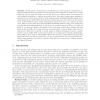107 search results - page 6 / 22 » When Random Play is Optimal Against an Adversary |
SPAA
2009
ACM
14 years 2 months ago
2009
ACM
We consider bit communication complexity of binary consensus in synchronous message passing systems with processes prone to crashes. A distributed algorithm is locally scalable wh...
ESORICS
2009
Springer
14 years 8 months ago
2009
Springer
Abstract. Several generic constructions for transforming one-way functions to asymmetric encryption schemes have been proposed. One-way functions only guarantee the weak secrecy of...
AINA
2010
IEEE
14 years 17 days ago
2010
IEEE
Cloud computing is an emerging technology that allows users to utilize on-demand computation, storage, data and services from around the world. However, Cloud service providers ch...
AI
2002
Springer
13 years 7 months ago
2002
Springer
TD-Gammon is a neural network that is able to teach itself to play backgammon solely by playing against itself and learning from the results. Starting from random initial play, TD...
ESA
2005
Springer
14 years 1 months ago
2005
Springer
We present a simple two-person Bucket Game, based on throwing balls into buckets, and we discuss possible players’ strategies. We use these strategies to create an approximation ...

